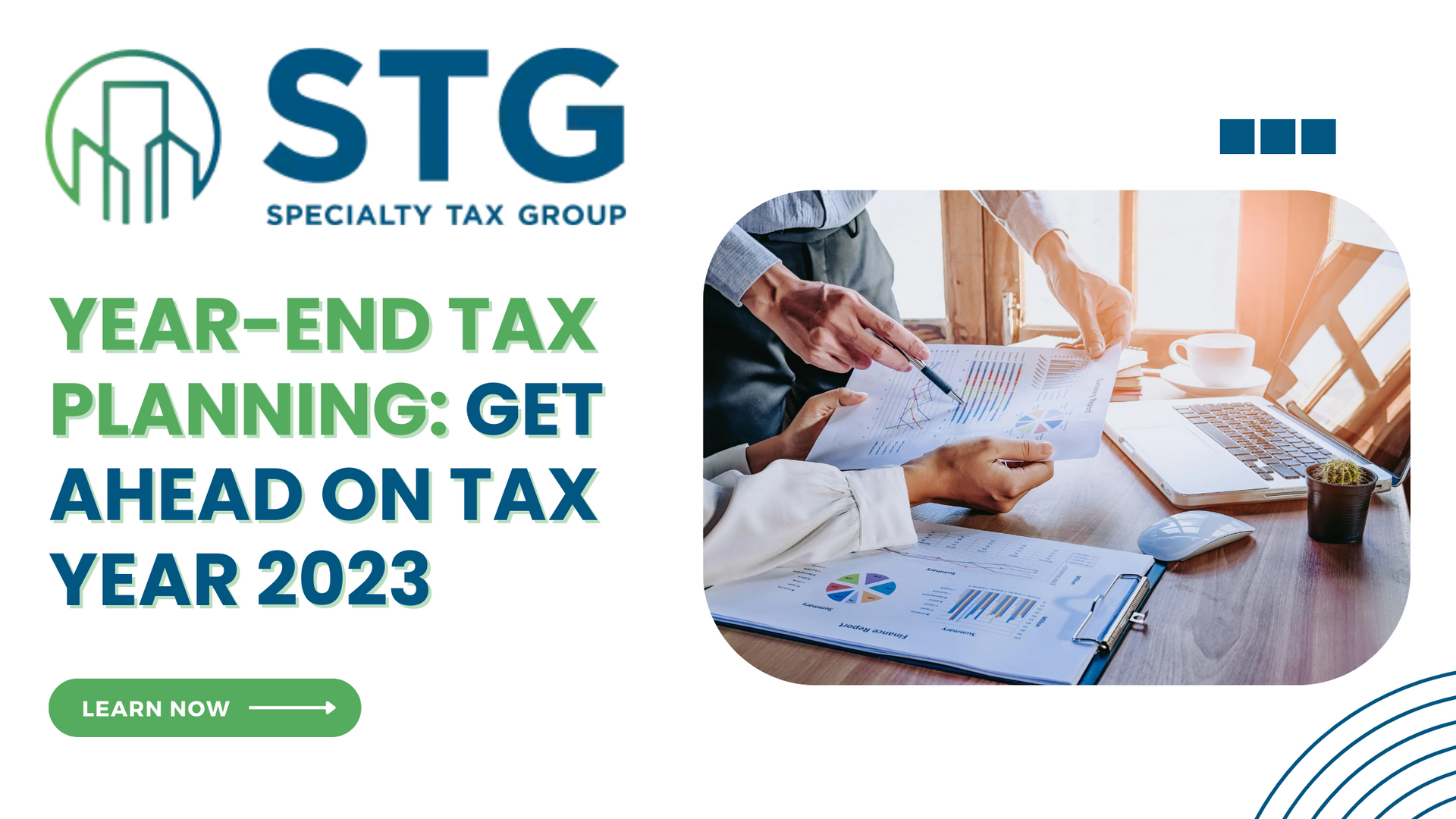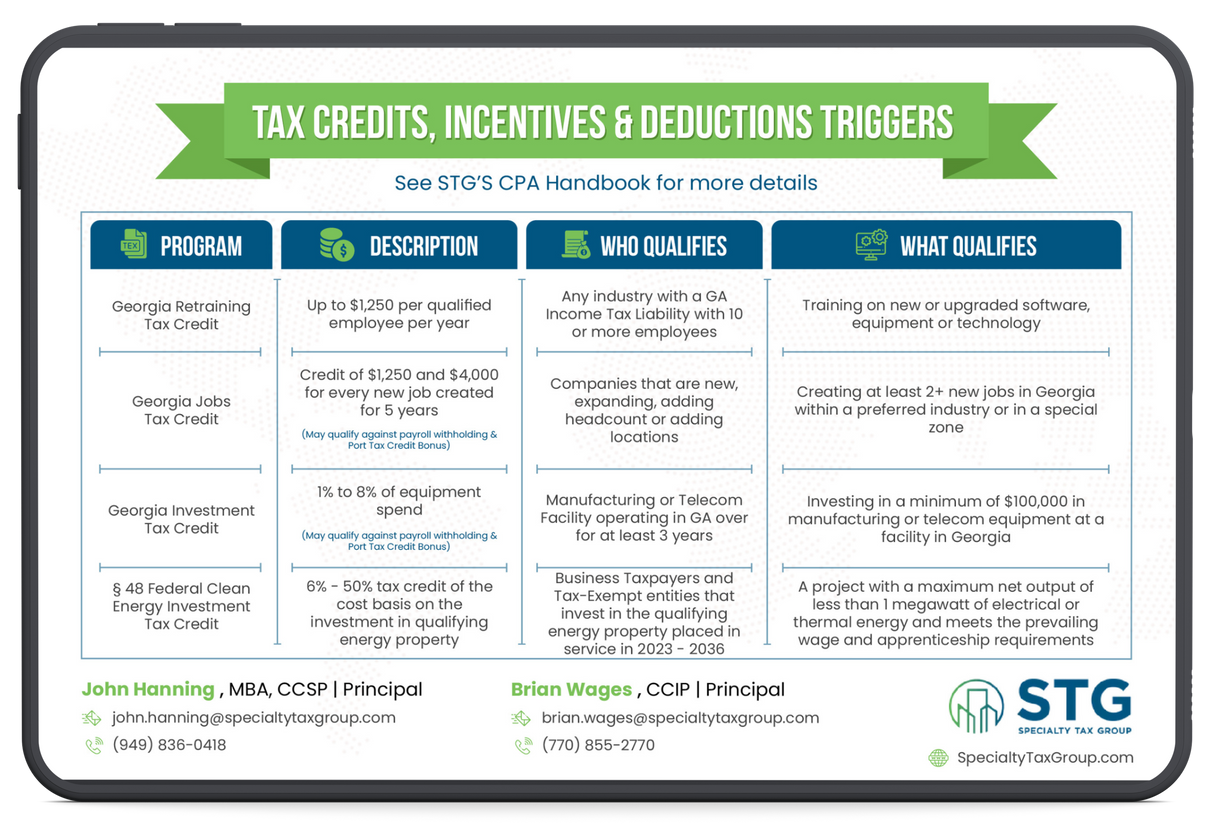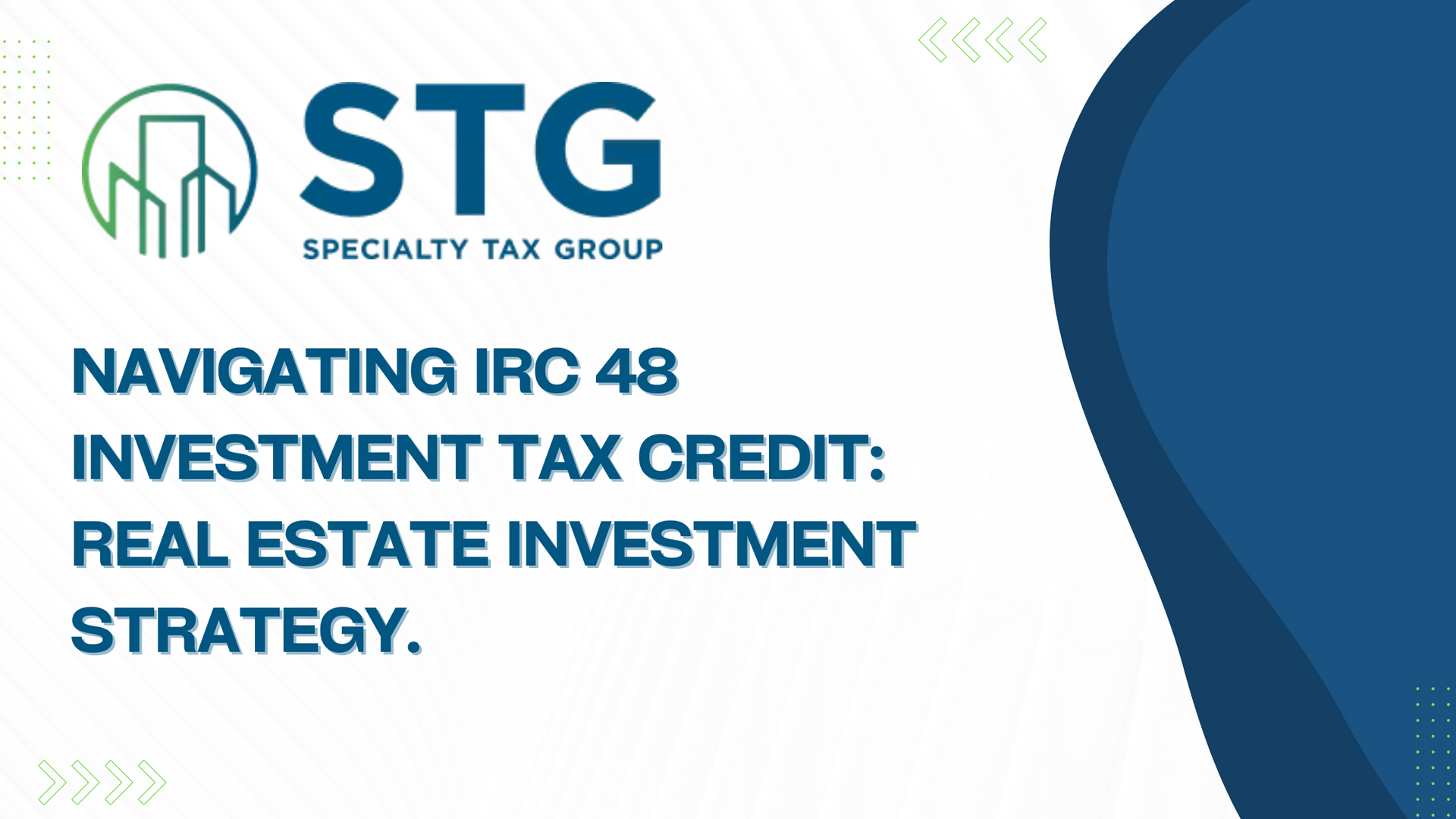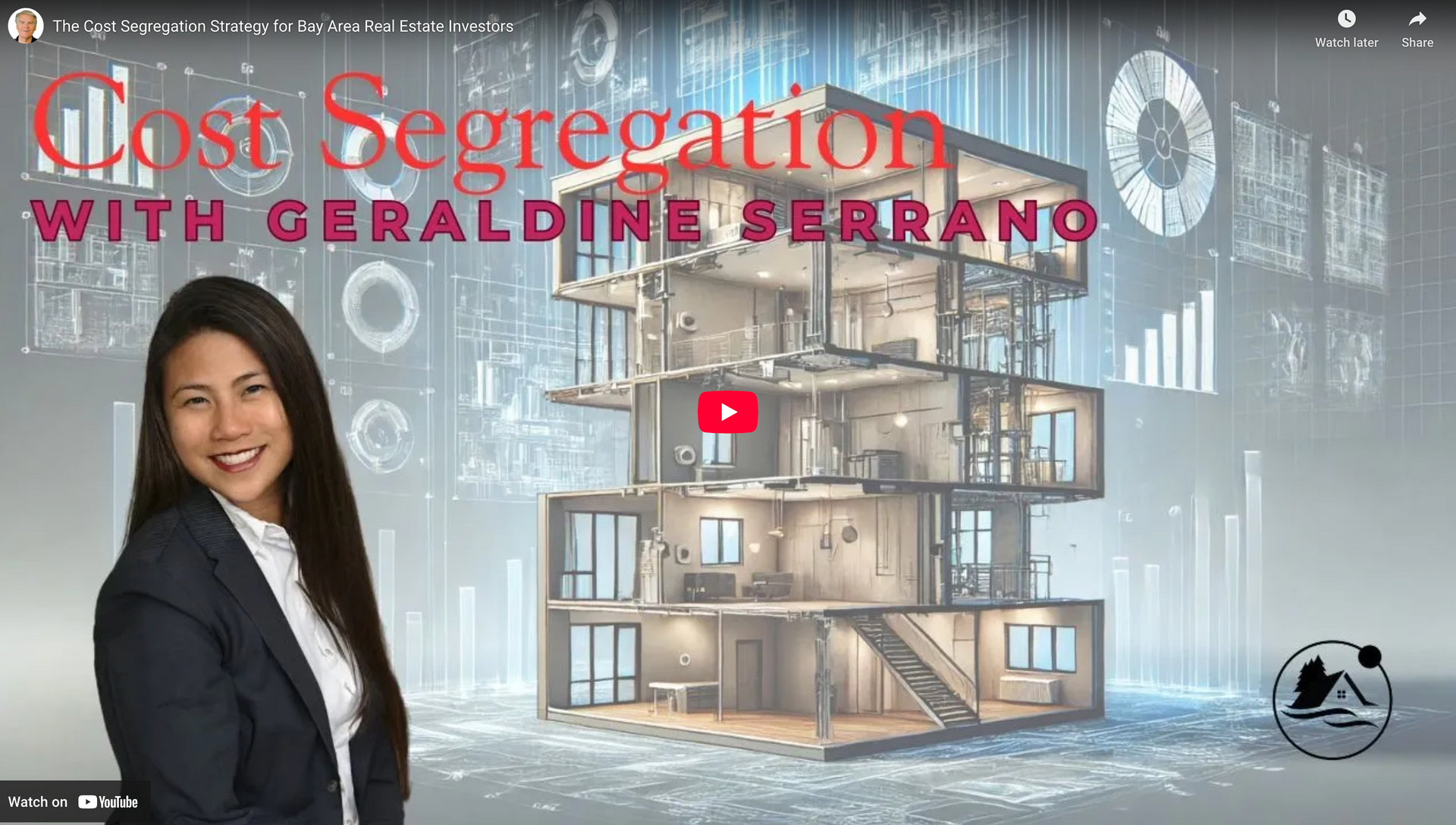This blog post has been researched, edited, and approved by John Hanning and Brian Wages. Join our newsletter below.
Newsletter Form
Getting Ahead In 2023
With the extension tax deadline of October 15th just passing, CPAs probably want to take a few days to rest and take some time off. Taxpayers with their inevitable tendency to wait until the last minute, have tax year 2023 out of sight and out of mind.
However, the end of the year is a prime time to plan the current year’s tax strategy, specifically to harness the financial benefits for the taxpayer’s qualifying activities.
Why Year-End Tax Planning is Critical
Year-end tax planning is an essential exercise for any taxpayer looking to minimize their tax liability through tax credits, incentives, and deductions. For CPAs, the year end tax planning process ensures that the busy tax season goes smoothly as well as letting their clients know that they have their bottom-line as an utmost priority.
The last thing a CPA would want is for their client to find out about a way to save on their tax liability from another CPA. That could lead to a loss of the client to the other CPA firm that could save them money.
One of the most compelling reasons to consider year-end tax planning is the array of tax credits and deductions that are available. By talking to an expert on these programs you can ensure that you remain compliant and continue to maximize the tax benefits available.
Flourishing with Foresight
Imagine this: By simply adjusting your financial actions a few months before the year ends, you find yourself with a significantly reduced tax bill. With the savings accrued from effective tax planning, companies can create opportunities.
For businesses, the magic of timely tax planning isn't just in numbers; it's in the enhanced operational efficiency. Companies that align their strategies with tax-saving opportunities find themselves with improved cash flows. This extra capital isn't just numbers on a balance sheet – it's an opportunity.
Understanding Triggers in Tax Credits
At first glance, the term 'triggers' might sound like jargon. But in the realm of tax credits, it's a concept that holds profound significance. In simple terms, triggers are specific actions or events that pave the way for an individual or business to become eligible for certain tax credits. Think of them as the golden ticket; once you have it, you're in the game.
The Importance of Precision
Triggers aren't just about actions; they're about precision. Every tax credit, with its associated trigger, may come with its set of requirements. It could be a deadline, the necessity for particular documentation, or adherence to specific criteria. Grasping these nuances is pivotal. It's not just about acting but acting right and on time.
By staying level with these triggers, individuals and businesses can seamlessly navigate the tax landscape, ensuring they're always in a prime position to capitalize on available tax credits.
Federal Deductions
Cost Segregation
- Description: A tax strategy designed to enhance cash flow and reduce income taxes for commercial property owners by accelerating depreciation. It involves segregating certain property components to allow for quicker depreciation rates.
- Who's Eligible? Owners of various commercial real estate types, including but not limited to: Apartments, assisted living/nursing homes, auto dealerships, office buildings, restaurants, manufacturing facilities, hotels, medical buildings, and retail spaces.
- Trigger? Constructed, acquired, or renovated a building or property within the last 10 years.
179D Energy Efficient Commercial Building
- Description: A Federal tax incentive designed to promote energy efficiency in commercial buildings. It provides deductions for installing energy-efficient lighting, heating, cooling systems, and building envelopes.
- Who's Eligible? Building owners, architects, contractors, designers, engineers, environmental consultants, and energy service providers are all eligible. Notably, professionals like architects and contractors can also qualify for the incentive on public projects.
- Trigger? Installation of energy-efficient lighting systems, heating and cooling systems, building envelope. The incentive was extended by the Consolidated Appropriations Act, 2021 and applies to residences sold or leased on or before December 31, 2021.
Tax Credit Programs
Navigating the landscape of tax credits, incentives, and deductions often comes with a maze of programs and incentives. These programs can be significant game-changers for businesses, and business and property owners alike. Let's delve into some of the main programs available:
Federal Research and Development Tax Credit
- Description: For businesses of all sizes that design, develop, or improve products, processes, techniques, formulas, or inventions.
- Who's Eligible? Any company that invests time, money, and resources for the advancement and improvement of products and processes.
- Trigger? Small businesses with $50 million or less in gross receipts and startup companies with less than $5 million in gross receipts and earning revenue for less than 5 years.
Georgia Retraining Tax Credit
- Description: Georgia Tax Credits allows businesses in Georgia to offset costs associated with retraining employees for new equipment or updated skills. The credit offers up to $1,250 per qualified employee annually.
- Who's Eligible? Any industry operating within Georgia with a minimum of 10 employees.
- Trigger? Training initiatives focused on new or upgraded software, equipment, or technology.
Georgia Jobs Tax Credit
- Description: New and expanding companies may earn Job Tax Credits for creating new jobs in Georgia. The JTC gives a qualified company a credit ranging from $1,250 to $4,000 per year for 5 years for every new job created.
- Who's Eligible? Companies that are Business Enterprises (Preferred Industries) or businesses within a special zone (Opportunity Zone, Military Zone, etc.)
- Trigger? A minimum of 2 to 25 net new jobs based on average monthly headcount depending on Tier and Special Zone.
Georgia Investment Tax Credit
- Description: Geared towards manufacturing or telecommunications support sectors, Georgia Tax Credits rewards companies that have been operational in Georgia for at least three years. The credits range from 1% to 8% of equipment expenditure.
- Who's Eligible? Manufacturing or Telecom Facilities that have been operating in Georgia for a minimum of three years.
- Trigger? A minimum investment of $100,000 in manufacturing or telecom equipment within a Georgia facility.
Tennessee Jobs & Industrial Machinery Tax Credits
- Description: Tennessee has rolled out Tennessee Tax Credits to spur organizations to purchase industrial machinery from qualified local manufacturers. The benefits include $4,500 for each qualified job created and a 1% credit on the qualified investment.
- Who's Eligible? Manufacturers, Data Centers, Call Centers, as well as Warehousing & Distribution entities.
- Trigger? A capital investment exceeding $500,000 in qualified industrial machinery or an increase in headcount (a minimum addition of 10 employees)
45L Energy Efficient Home Tax Credit
- Description: a tax incentive that offers a $2,000 credit per dwelling unit to owners and developers of energy-efficient homes and multi-family buildings. To qualify, buildings must be three stories or fewer and should incorporate features enhancing energy efficiency, such as superior insulation and roofing, advanced windows, doors, and HVAC systems.
- Who's Eligible? Eligible buildings include apartments, condos, affordable housing, assisted living homes, and student housing.
- Trigger? The building's energy performance and the inclusion of energy-efficient features are primary triggers. A dwelling unit's heating and cooling energy consumption should be notably lower than particular national energy standards. Additionally, any residential development or apartment building completed within the last 4 years.
Federal Clean Energy Investment Tax Credit
- Description: A federal tax program encouraging clean energy investments. It offers financial rewards to people and businesses investing in renewable energy sources like solar, wind, geothermal, and fuel cells.
- Who's Eligible? Available to both individuals and businesses that invest in qualifying clean energy projects. This includes renewable energy sources such as solar, wind, geothermal, and biomass.
- Trigger? Setting up or building an approved clean energy asset. To access the credit, the taxpayer must finish setting up or constructing a certified clean energy initiative. Another trigger is the start of its commercial use.
The Pivotal Role of Year-End Tax Planning
Year-End Tax Planning is more than just a tax strategy; it's a comprehensive financial tool. It provides clarity, ensuring you're not just compliant but also making the most of every tax benefit available to you. By evaluating and tweaking your financial actions before the year concludes, you stand to optimize your savings and slash your tax liabilities.
By proactively managing finances, understanding the implications of every financial move, and aligning with available tax credits (like those for clean energy investments), you're not just saving money – you're paving the way for a financially optimized future. It's no exaggeration to say that diving deep into Year-End Tax Planning can truly be a transformative experience.
The Power of Timing
The clock's ticking, and every financial decision you make can influence your tax outcomes. Recognizing this, Year-End Tax Planning emphasizes the significance of timing. Whether it's accelerating certain expenses, deferring specific income sources, or strategically aligning the recognition of income with payment timings, every move can bear fruitful results. In simple terms: when you act can sometimes be just as important as what action you take.
Your Next Step?
Don't leave potential benefits on the table! Consult with experts at the Specialty Tax Group (STG). With their guidance, you can discover available programs and triggers, ensuring you maximize every benefit available to you.
And as you embark on this journey, remember: it's not just about the fiscal benefits. Every decision, every investment, and every step towards optimizing tax credits is a stride towards a greener planet. Let's invest in a brighter, more sustainable future!






